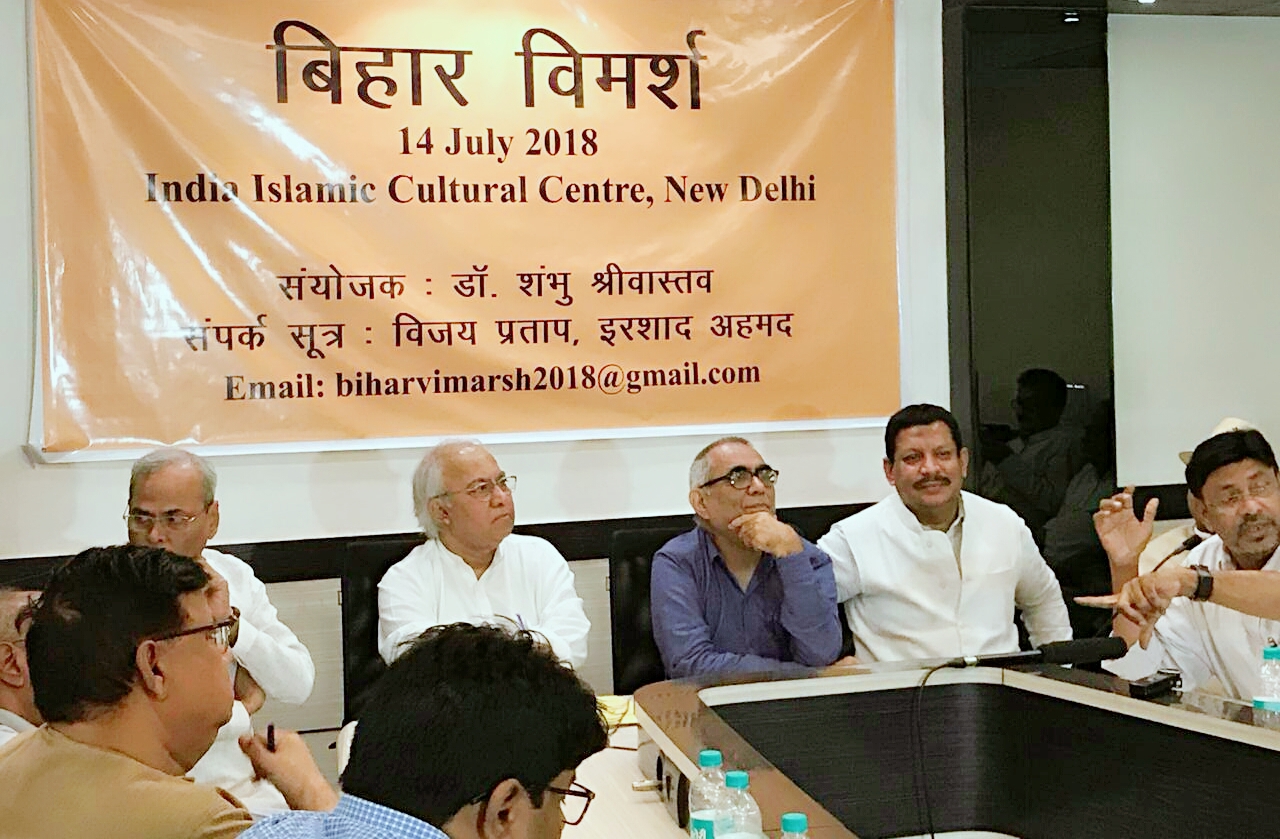Bihar intellectuals favour mainstream parties to keep off saffron discourse
 M. CHENNANAGRAJ
M. CHENNANAGRAJ
NEW DELHI: Concerned about the country’s polity veering towards religious polarisation ahead of 2019 Lok Sabha polls, a group of Bihar’s intellectuals here have vowed to identify issues to ward off elections from an imminent dangerous course.
Christened as “Bihar Vimarsh”, the group is headed by Dr Shambhu Sharan Srivastava, a trusted aide of ailing socialist leader and former Defence Minister George Fernandes, Senior Social Worker Mr Vijay Pratap and Former and former AMU Old Boys Association Irshad Ahmed held its preliminary meeting in the capital here.
Without taking the names of any political parties, he said our prime challenge is to identify issues concerning common man and prompt ideology based discussions among the mainstream parties rather than allowing them to drift towards dangerous communal discourse, which was not good for anybody.
“The country’s past is certainly honourable but the society cannot be in peace, when present is pinching”, Dr Srivastava, a prominent Nitish Kumar critic and a former member of Bihar Legislative Council. The group leaders who once was the core in the socialist movement in Bihar’s tempestuous politics had turned inactive after the takeover of the party by chief minister Nitish Kumar.
Bihar government is proudly proclaiming at 10 percent growth in the Gross Domestic Product in the state. But there is no answer from anyone as to why there has been no let up in the migration of Bihar’s workers, Dr Srivastava said.There can also be no condoning of the fact that Bihar still continues to be in the same 32nd spot even after the so-called spectacular achievement of double digit growth,
He said pointing to the Reserve Bank of India figures that showed states like Maharashtra (1.31 Lakhs) (Haryana (Rs 1.43 Lakhs) and Karnataka (1.20 Lakhs). Union Territories of Delhi, Goa too had higher Per capita income than Bihar’s mere Rs 26,693 in 2016-17. There is no glory in claiming 10 percent achievement by Bihar as it still occupies last slot in the bottom of the pyramid. It’s 32nd spot is constant, he said.
Pointing to the inability of the Bihar’s main opposition party Rashtriya Janata Dal of Lalu Prasad and the Congress, Dr Srivastava said the opposition was not confronting the BJP-J D (U) combine with ideological content. Laluji successfully mopped the votes of of voiceless people for 15 long years but he utterly failed in delivery on its promises.
Even today, the lives of farmers can improve, if only the state can provide cold chain infrastructure to the farmers for higher returns. Presently, vegetables, including potatoes, onions and tomatoes were sold at distress costs by the farmers. The government should provide value addition opportunities.
Biharis residing outside state to identify ideologies based issues for discourse among major parties and defeat the communal agenda. The centre’s stance on privacy issues was also a matter of concern as the government wanted to have a say on every issues of the citizenry in everything that mattered. “Are we heading towards an intrusive surveillance state” as suspected by the apex court of the nation”, he asked.
Mr Prem Kumar Mani, another Bihar’s MLC, felt that the ruling BJP in Bihar was sure of votes of around 34 percent were eyeing for six to seven percent additional votes. This was where Nitish Kumar came into the picture. Once elections were over, he would be of no use for the BJP, he felt.
He said, distribution of swords and tridents on Ramanavami day in Bihar was a danger to public peace. People of different faiths had led a harmonious lives for generations and all that was now under question, he said.
Senior journalist Aravind Mohan, who had conducted a study of migration pattern in Bihar said his recent studies had shown that the migration of labour continued during the past two decades.
The new migration pattern was that flow was to the west and southern states. Earlier the route was confined to north. Now migrants could be found in toddy and rubber tapping trades in Kerala, the southern most state.
“Migration is a global phenomenon but if it is happening for food and such basic reasons, it would be a sad reflection on the quality of governance. “It is most painful”, he added.
Mr Anil Singh, a former JNU leader found fault with the affluent and successful migrants in returning their might their home land. Even if there were investments back in Bihar, it was on ‘non-productive assets’ which was not good for the society. He recalled the famous village which prided itself for contributing 56 IITians to the nation but the village’s plight remained unaltered, he regretted.
An Aligarh Muslim University alumni said that minority too should share the blame for extreme views fuelled by the clerics. However distribution of swords and tridents didn’t bring any relief for peace.
An NTPC former engineer Ahmed Rayees Siddiqui turned sports commentator said that there could no complaint against the system as the talent was respected and accommodated. But the political competition on ‘Ram-Rahim’ lines was not in the national interest. He would urge the group to support power generation units as it was the best source for job creation.
Peace Activist Ms Priya Jana spoke about women related issues. Shaikh Imran Alam, UNDP official Mr Sanjay Rai, Mohamed Munawar and Delhi Bar Council Secretary Mr Murari Tewary also spoke on the Bihar related problems.

